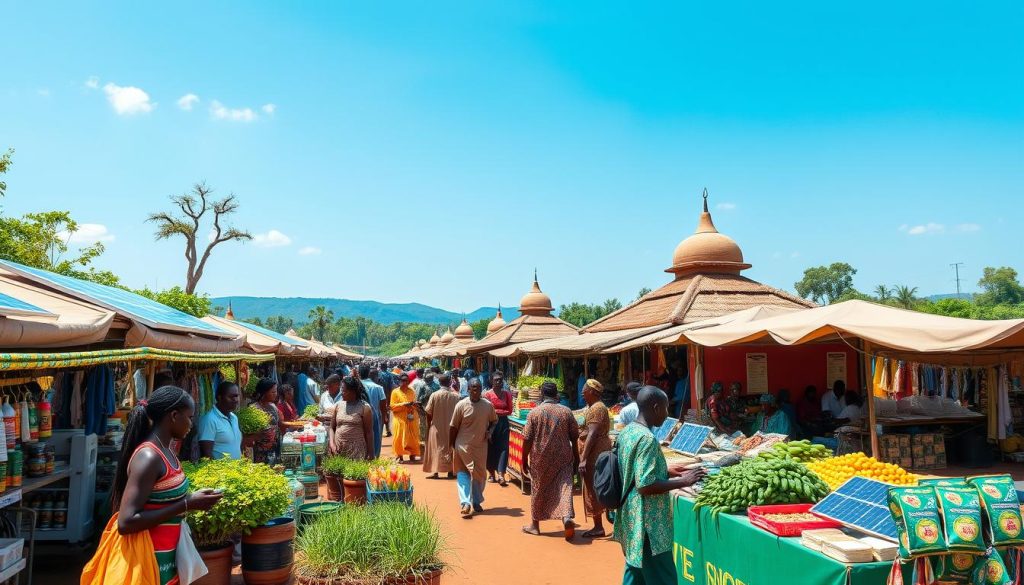Africa is rich in diversity and potential, making it a hotbed for entrepreneurship. The continent’s young and agile population is set to grow to over 2 billion by 2050. This promises a boom in entrepreneurial activities. Whether you’re an experienced entrepreneur or just starting, exploring African business opportunities could mark a turning point in your career. This guide to 102 business ideas covers everything from small business ideas combining traditional and modern needs, to tech-driven solutions catering to local demands.
The continent’s natural resources and cultural wealth have long been captivating. Now, with booming tech hubs and an evolving agricultural sector, there’s even more scope for business. These 102 ideas aim to inspire and provide insights into emerging market trends and industries ready for investment and innovation. Join us in navigating the exciting realm of business opportunities in Africa, promising growth and sustainability in its fast-changing economies.
Emerging Sectors in the African Economy
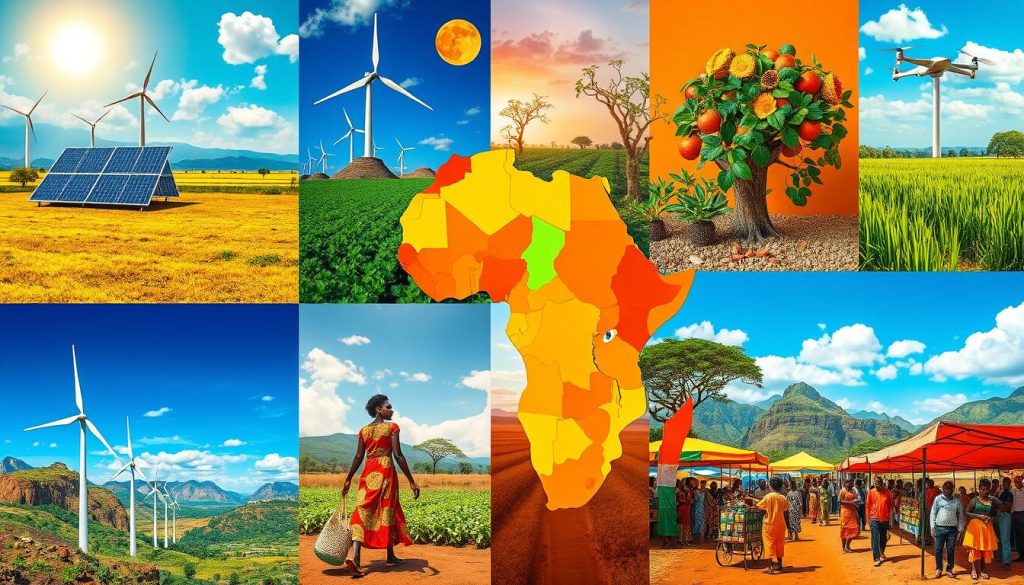
In recent years, Africa has seen major changes, creating investment opportunities in emerging African industries. This development is reshaping the continent’s economy and spotlighting its role in the global market.
Renewable energy and digital transformation are key growth sectors in Africa. They’re growing quickly because of a focus on sustainable development and tech progress. The growth of these sectors is boosted by Africa’s growing middle class. This group is eager for new and innovative products and services.
- Digital Transformation: Businesses are embracing digital tools to improve their operations and connect with more customers.
- Renewable Energy: Africa is rich in solar, wind, and hydro resources, making it ideal for green energy investments.
- Consumer Services: A growing middle class wants more retail, financial, and leisure services, opening doors for businesses.
For investors, these emerging sectors are not just profitable. They also help in advancing social and economic development across Africa. By putting money into these areas, businesses can tap into great growth potential. They also help in improving the local economy.
Potential investors should start with detailed market research. Understanding the specific challenges and regulations in different African areas is crucial. This way, they can achieve the most impact and success in these exciting and evolving markets.
Profitable Agricultural Ventures
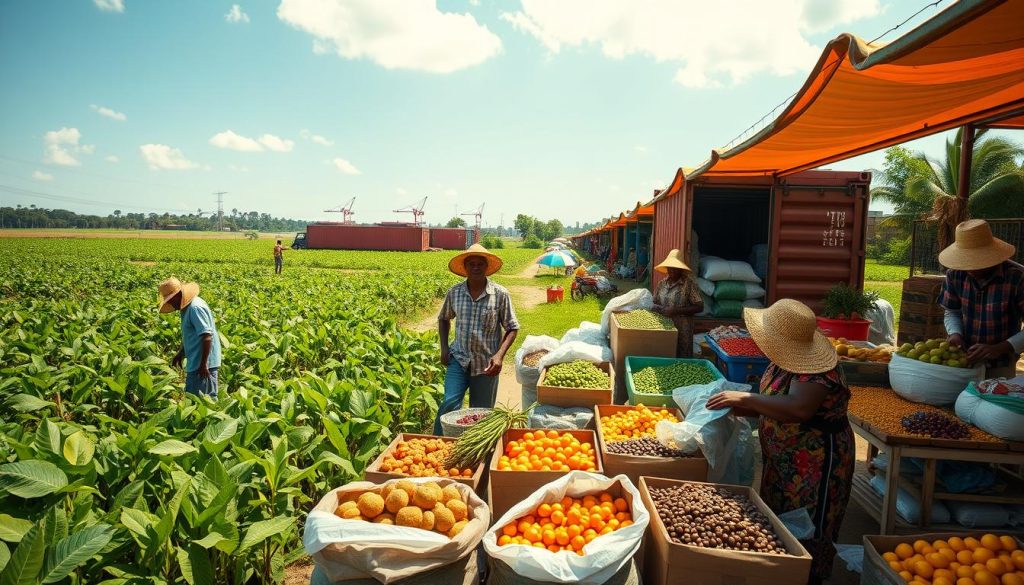
Agriculture is key to boosting economies in Africa. It shows great potential through new methods and adding value. This section explores how modern techniques and smart market integration can make farming profitable. It also looks at promoting lasting agriculture.
Innovative Farming Techniques
To address the growing need for food and overcome traditional farming limits, new farming methods are used. Techniques like hydroponics and vertical farming change how we farm in Africa. They allow farmers to grow more using less resources – less water, less space, and creating less waste.
- Hydroponics enables soil-free farming, with plants growing in a water-based, nutrient-rich solution. This method is efficient in water usage.
- With vertical farming, crops are grown in vertical layers. This method uses less land and increases yield per square metre.
Export-Driven Agribusiness Opportunities
Entering export markets is a powerful approach for Africa’s agribusiness. By focusing on producing quality products ready for export, African agribusinesses can access valuable foreign markets. This not only raises profits but also boosts the sector’s impact on national economies.
- Creating export consortia helps smallholders reach bigger markets.
- Obtaining certification and meeting international standards are key to export success.
- Forming strategic alliances with world distributors helps navigate the complexities of global trade.
Value Addition in Agriculture
Enhancing the value of raw agricultural produce significantly increases their value, boosts local economies, and makes businesses appealing in local and export markets alike. By turning raw materials into finished or semi-finished products, agribusinesses can raise prices and profits.
- Processing fresh fruit into dried fruit or juice concentrates extends shelf life and aids in exporting.
- Producing premium packaged spices and herbs, aimed at gourmet markets both domestically and internationally.
- Creating organic and health-focused products meets a growing demand for healthy, safe, and sustainable food globally.
Technology Start-ups Shaping the Future
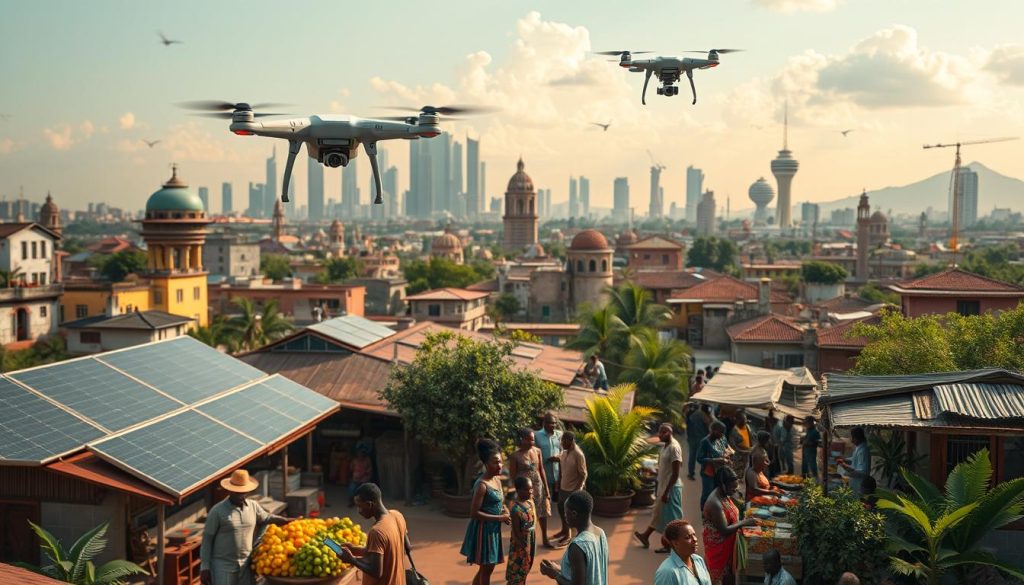
In Africa, tech start-ups are leading the way in innovation. They use mobile technology to create solutions that fit local needs perfectly. These start-ups are changing technology and the economy. They focus on areas like app development, e-commerce, and fin-tech.
Mobile Application Development
With more people using mobiles in Africa, tech start-ups see a big chance. They make apps that help with health, education, and money matters. These apps are not only handy; they also push African tech innovation from the ground up.
E-commerce Platforms
E-commerce is booming in Africa, thanks to new local online shops. These sites tackle old trading problems, like logistics, payment, and reaching customers. They change retail and help local firms succeed online.
FinTech Solutions
In fin-tech, African start-ups are doing great things. They offer new services to those without banks or much money. With mobile banking, small loans, and insurance, they’re changing how people handle money in Africa.
These tech start-ups are not just pushing African innovation. They also boost the area’s economy and society. There’s still a lot of room for them to grow, making a future where tech keeps making life better in Africa.
The Booming Construction Industry
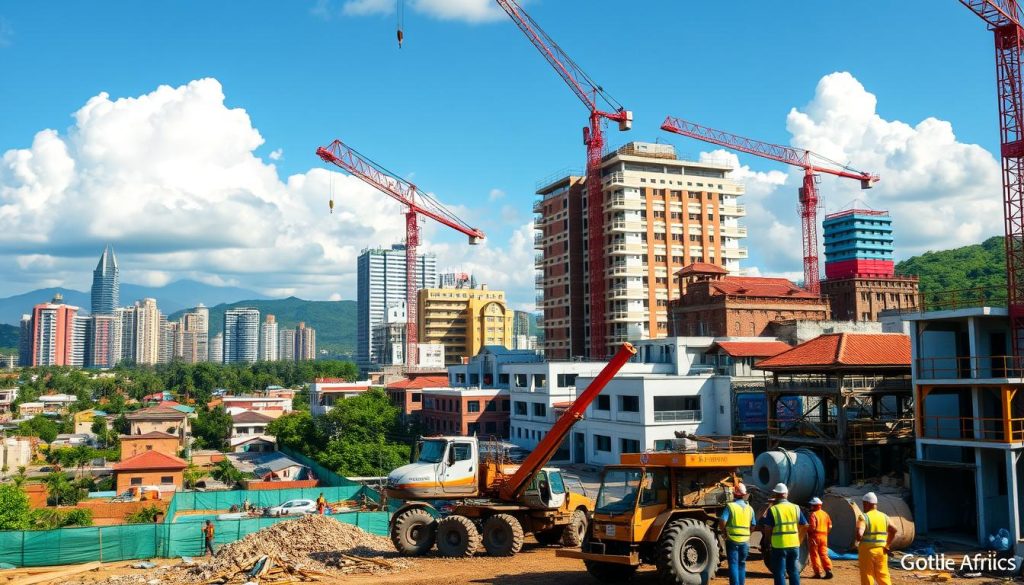
Africa is facing an impressive growth phase with lots of new buildings and infrastructure projects. This growth is mainly due to more people moving into cities and a need for better housing. This has made Africa a key place for investors and builders.
But it’s not all about new buildings. There’s also a big push to make new roads, bridges, and utilities. These are vital for a strong economy. Let’s look at some major gains from these efforts:
- Urban areas are growing, making room for more people with modern facilities.
- There’s a move towards building in a way that’s better for the environment.
- New transport links are being made to improve connections within and between countries.
At the same time, the property market in Africa is booming. This boom is happening in places people live as well as in business areas. Here’s why this is happening:
- A lot of people are moving to cities, creating a need for more houses.
- Overseas investors are keen on Africa’s property market.
- The middle class is growing in many African countries, leading to demands for better living.
To sum it up, this building spree is changing Africa in many positive ways. It’s sparking economic growth and making things better for everyone. With a focus on building in a green and sustainable way, this sector offers good investment chances. It also helps society progress and take care of the environment.
Healthcare Initiatives That Save Lives
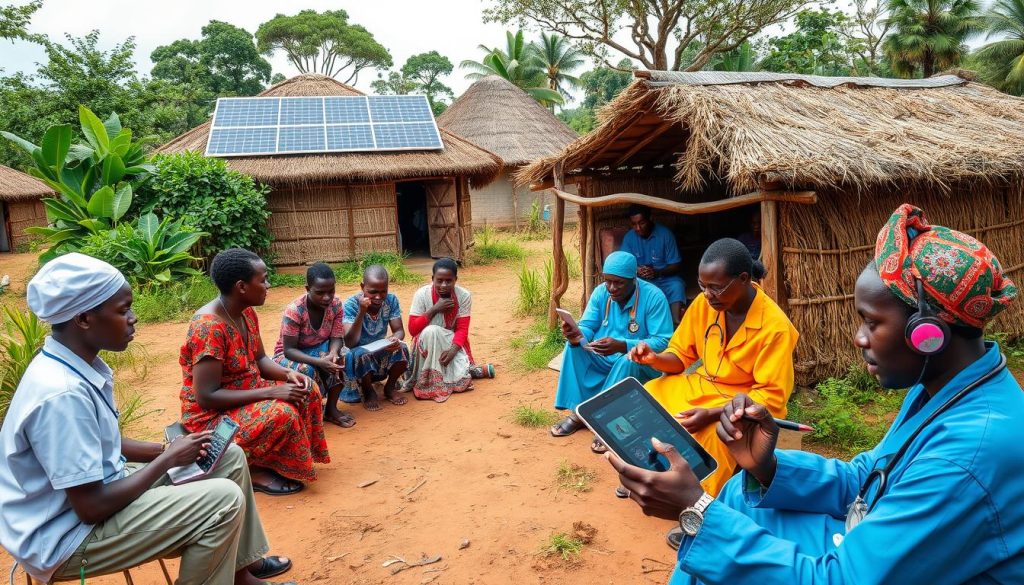
Improving access to quality healthcare is urgent. In areas with few resources, new ideas like telemedicine, making drugs locally, and special training schools are changing health services. They are key in making healthcare better.
Telemedicine Services
Telemedicine is changing healthcare, especially in distant places. It lets patients talk to doctors online, without travelling. This means quicker care.
Local Pharmaceutical Production
Making drugs locally cuts down on needing imports. It ensures a constant supply of key medicines. This not only helps the drug sector but also makes jobs and grows local knowledge in making drugs.
Healthcare Training Institutions
Training schools for healthcare are vital. They prepare the staff needed for new healthcare services. By training locals, they can deal with everything from online medicine to handling drugs.
Ecotourism and Conservation Projects
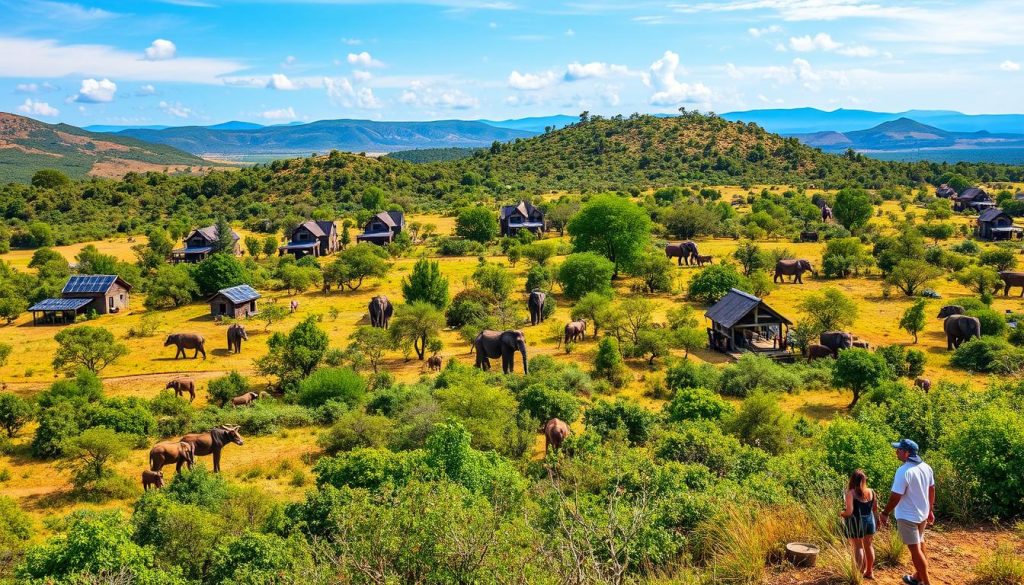
The interest in sustainable tourism is sparking new conservation projects. These projects protect our environment and offer unique trips. You will find wildlife safaris, eco-lodges led by local communities, and tours for marine conservation growing in popularity. They attract travellers keen on wildlife conservation and eco-friendly travel.
Wildlife Safari Ventures
These ventures offer a close-up of nature, giving insights into the importance of saving natural habitats. By seeing wildlife and conservation challenges firsthand, people learn about the value of sustainable tourism.
Community-Based Eco-lodges
Local communities run eco-lodges that limit environmental harm and benefit local economies. They use renewable energy, recycle, and practice other green methods.
Marine Conservation Tours
Tours focused on saving marine life let visitors help with coral reef restoration or protecting sea turtles. These experiences teach the importance of saving the oceans. They show tourists how to contribute to conservation and enjoy eco-friendly travel.
- Direct engagement with conservation activities
- Support to local economies through eco-tourism
- Preservation of wildlife and natural habitats
Launching these projects helps protect the environment and educates tourists on responsible travel. As interest in sustainable travel grows, merging conservation with tourism could help us meet global sustainability goals.
Renewable Energy Solutions for Sustainability

Africa is moving towards a future where clean and sustainable solutions are key. The continent’s ability to use renewable resources is getting a lot of attention. The energy sector’s change aims to combine economic growth with looking after the environment. This puts solar power, wind, and geothermal technologies in a leading position. We’re looking at the business and growth opportunities that green energy investments offer.
Starting solar power projects helps reach green energy goals. It also moves communities towards sustainable development. These projects have many benefits. They provide clean energy and create jobs in engineering, installation, and maintenance.
- Scale of solar farms correlates directly to their potential in revolutionising local energy grids.
- Small-scale solar solutions empower remote areas, reducing dependency on non-renewable energy sources.
Geothermal and wind energy also add major benefits. These resources are abundant in some African regions. They offer strong alternatives to conventional energy. They promise a smaller environmental impact and a sustainable electricity supply chain.
- Exploring and developing geothermal sites can boost local economies and lead to technology advances.
- Investing in wind energy benefits from Africa’s large plains and coasts, perfect for big wind farms.
Moving towards sustainable development in Africa needs efforts from many countries. Using innovations in green energy is essential for a prosperous, sustainable, and inclusive future. Mixing ecological care with business opportunities ensures that renewable energy projects are feasible. They’re central to the continent’s growth plan.
Food Processing and Preservation Industries
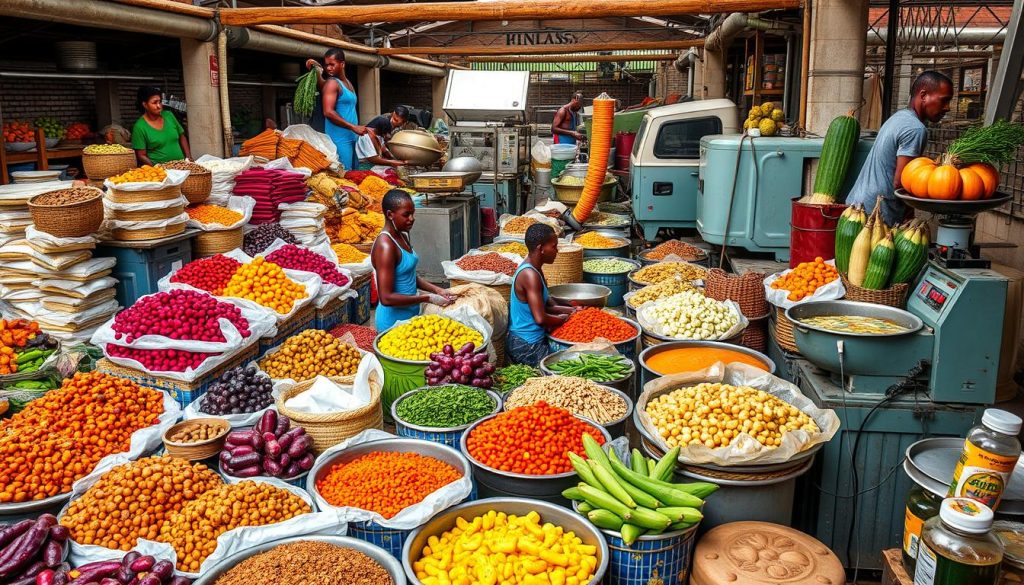
In today’s world, people want quick and efficient food preservation and convenience foods more and more. This shows big chances for growth and new ideas in the food business. We explore how these are becoming part of the food processing industry to meet changing consumer demands.
Indigenous Snack Production
Making indigenous snacks keeps cultural traditions alive and answers the call for unique, healthy fast foods. By using local ingredients and age-old ways of keeping food, these snacks offer a reliable income for local people. They also help the food sector grow.
Cold Storage Solutions
Good cold storage is key for keeping perishable items fresh longer, cutting waste, and keeping their health benefits. Growing these storage spaces helps local growers and makers, making sure their goods get to buyers in the best state. This helps with food availability too.
Ready-to-Eat Meal Packs
As cities get bigger, more people want meals that are ready to eat. These meals are all about being easy to use and stay fresh and safe with the help of modern keeping techniques. This part of the food industry is quickly getting bigger, bringing new tastes and healthy options to people.
Transport and Logistics Tailored for African Markets

Africa is growing fast, and with that, the need for good transport and logistics is key. Innovative logistics are helping the continent find new ways to move goods. This boosts trade within Africa and makes city travel better.
Intra-African Trade Corridors
Boosting trade between African countries is essential for economic growth. Improving roads and railways helps move goods more easily, cutting costs and opening up markets.
Urban Transport Services
Busy cities are looking for smart travel solutions. They’re using things like fast bus systems and car-sharing. These changes make transport quicker and cleaner.
Drone Delivery Innovations
Using drones for deliveries, especially to far-off places, marks a big push in logistics. Drones make deliveries faster, cheaper, and reach places hard to get to otherwise.
Revolutionising Education Through EdTech

Education technology is changing schools and learning worldwide. It’s making a big difference in Africa. By using the internet and digital tools, everyone can get to quality education, no matter where they are.
Digital learning is reaching people everywhere. It’s perfect for places without lots of schools. Now, anyone can learn online. This is changing education for the better and making it easy for everyone to keep learning through their lives.
- Educational technology makes learning custom. It changes to fit how fast or slow someone learns.
- Online lessons are now full of videos and interactive stuff. This makes learning fun and helps you remember more.
- With digital classrooms, it doesn’t matter where you are. People in far-off places can learn just like everyone else.
Tech in education is breaking down old barriers. It’s making sure everyone can learn and grow. Africa’s future is bright, with more and more people getting educated online. We are heading towards a smarter, well-informed generation.
Local Content Production in Media and Entertainment
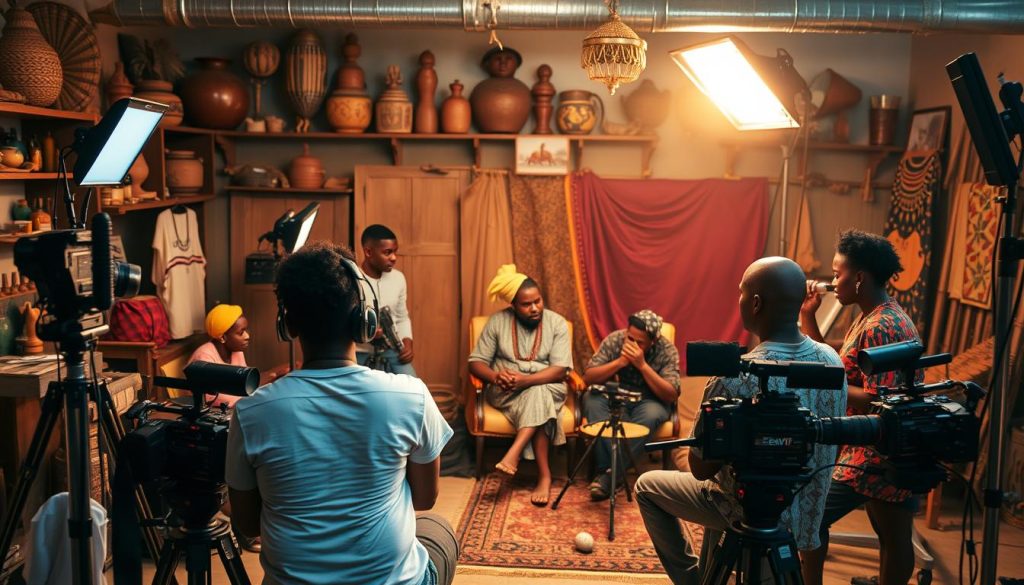
Africa’s entertainment industry is growing fast, thanks to a focus on local content. It uses digital media to reach people worldwide. This growth helps keep African culture alive and opens new economic paths.
By using local stories and culture, Africa’s entertainment can create works that appeal both locally and globally. Moving into digital media helps it stand out. It attracts both investors and audiences.
African Film and Television
More African films and TV shows are being made. They share African tales and folklore. These works are full of local flavor and are getting recognized worldwide. They help the world see Africa in a new light.
Music Production and Distribution
Music is key to African culture. Digital platforms are transforming how local music is shared globally. This makes African music easy to find all over the world. It helps spread African culture far and wide.
Animation and Gaming
Animation and gaming are new areas for African digital creators. They’re making content that tells local stories. This opens up jobs and taps into the big gaming market.
Combining technology with traditional stories through local content isn’t just saving heritage. It’s helping create a bright future for Africa’s entertainment industry.
Financial Services That Drive Inclusion
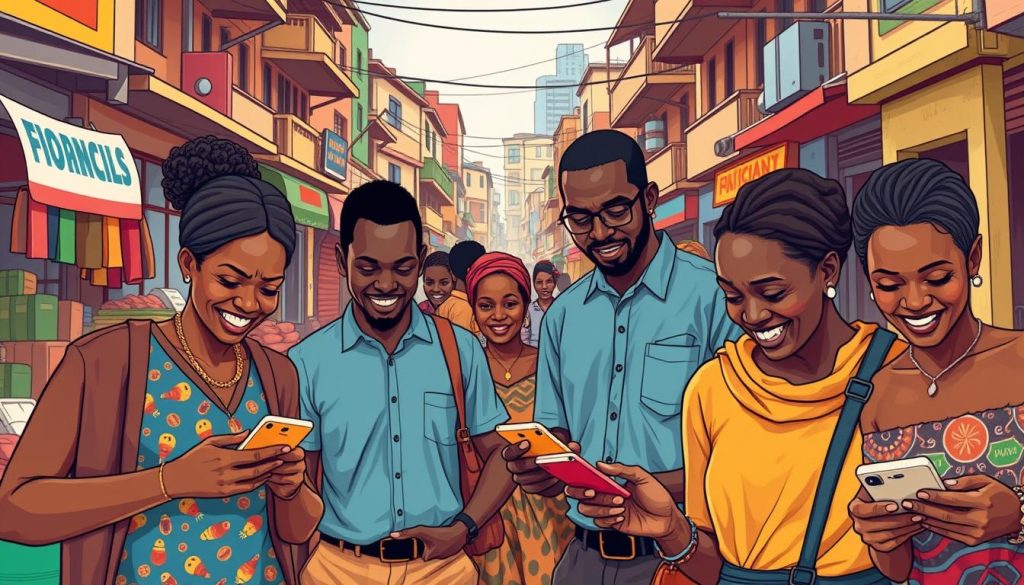
Today, the world is focusing on financial inclusivity. Services like microfinance, mobile financial services, and special insurance products are making big changes. They help connect people without access to traditional banks to the services they need. This helps grow the economy and make it more stable.
Microfinance Institutions
Microfinance is changing how people access financial services. It offers small loans and savings options to those who usually can’t get them. This significantly helps individuals and small businesses grow by being part of the economy.
Mobile Banking for the Unbanked
Mobile financial services have hugely changed how people bank. With simple SMS transactions and apps, even those without a bank can now do banking. This breaks down big barriers, making it easier for everyone to manage their money quickly.
Insurance for the Informal Sector
Special insurance products for the informal sector offer much-needed protection. They cover health, property, and work-related risks. This keeps workers safe outside the formal job market, boosting their well-being and the economy’s stability.
Retail Revolution with E-Commerce Integration
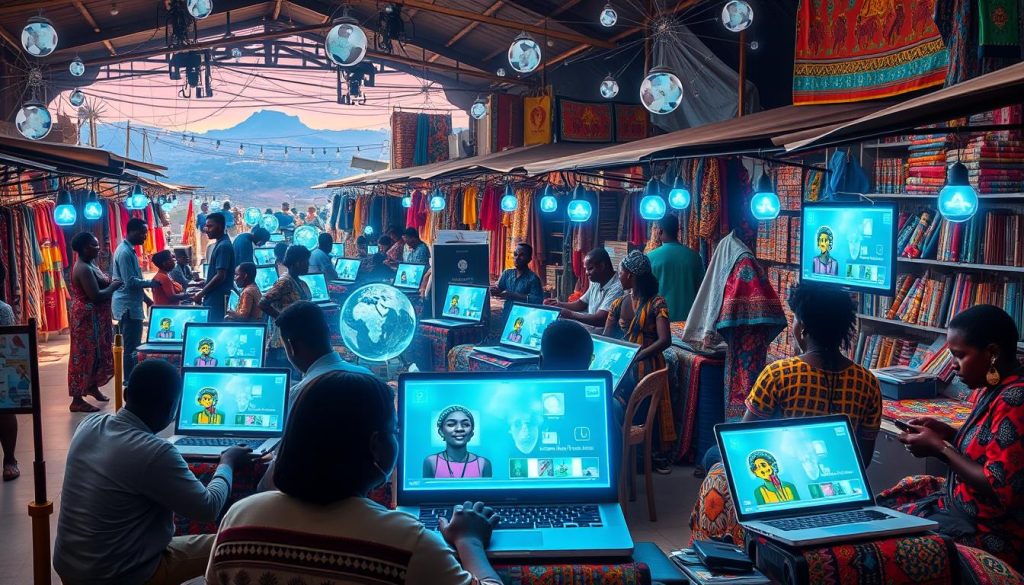
The rapid rise of e-commerce in Africa is changing how we shop online. This revolution creates a lively ecosystem for sellers and buyers. It’s changing how customers behave, focusing on convenience and choice.
E-commerce is breaking down old barriers. Sellers can now reach customers far away. It offers bigger markets and better shopping experiences.
- E-commerce platforms let sellers market in new ways, like targeted ads and personal tips.
- They use real-time data to manage stock better and understand what customers want.
- More payment options, including mobile money, make shopping online easier for more people.
Digital markets push local shops to keep improving. E-commerce means businesses must always think of the customer first and work more efficiently. These changes are making the retail world more digital for the long term.
As e-commerce and technology grow together, a vibrant digital market is forming. It meets the changing needs of all kinds of shoppers. This is transforming markets throughout Africa.
Real Estate Development for Urban Growth
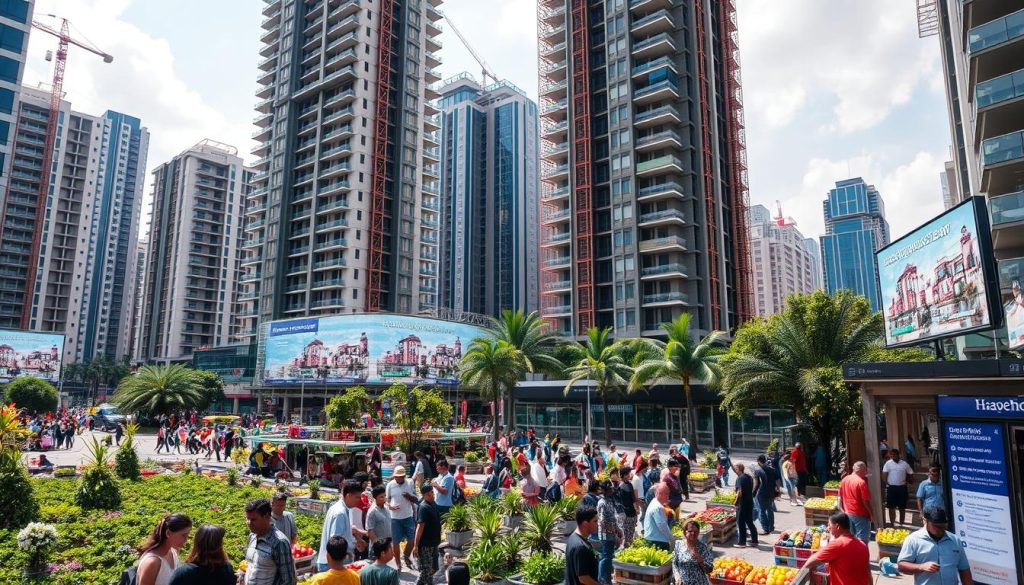
Cities are growing faster than ever, which puts the spotlight on the real estate sector. This includes affordable housing, commercial property investment, and real estate crowdfunding. These areas offer great financial opportunities and help meet the demand for living and working spaces in busy urban areas.
Affordable Housing Solutions
There’s a pressing demand for affordable homes in cities. To meet this need, developers are using new building technologies and smart designs. This helps make homes more affordable for families with lower incomes.
Commercial Property Investments
As cities get busier, the demand for commercial spaces rises. Investing in well-located offices, retail areas, and mixed-use buildings can lead to good returns. This is because of their high demand and excellent location.
Real Estate Crowdfunding Platforms
Crowdfunding makes property investment open to more people. It’s becoming popular because it allows many small investors to join in on big property deals. This way, projects that were once only for the rich or big investors are now accessible to more people.
Creative Artisanal and Craft Markets
The vibrant creative artisanal and craft markets are a highlight of African enterprise. These markets are crucial for local economies and help keep cultural traditions alive. They have become popular globally, attracting people interested in genuine African art. African textiles, famous for their complex designs and vivid colours, enhance Africa’s position as a source of unique products.
Traditional Textile Production
Traditional textile making in Africa is an intergenerational craft. It represents the continent’s history and cultural diversity. These textiles tell stories of community and identity. Global interest in these items has opened new opportunities for artisans. They lead in offering sustainable, ethical products that blend ancient stories with modern fashion needs.
Handcrafted Jewellery and Accessories
African artisans create unique jewellery and accessories with unmatched skill. Every piece showcases the essence of African craftsmanship. These items are in demand worldwide. Artisans combine old techniques with modern styles, making Africa a prime source for expressive jewellery.
Cultural Tourism and Craft Sales
Cultural tourism in Africa offers memorable experiences through craft sales. Tourists love the combination of exploring cultural heritage and buying unique crafts. This benefits artisans and encourages cultural exchange. Crafts bought this way celebrate African culture, building greater appreciation for its diversity.

